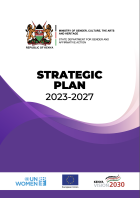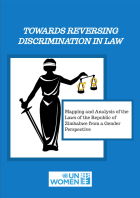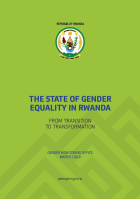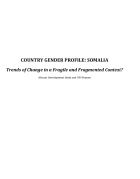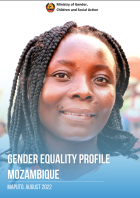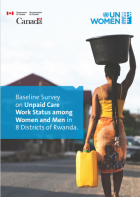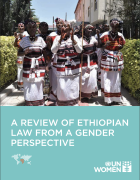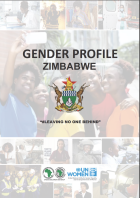1 - 20 of 22 Results
Pagination
Date:
The Publication is a detailed strategic plan for the period 2023-2-27. It highlights previous achievements, lessons and emerging issues that define the policy direction of the gender sector achieving a society free from gender discrimination and violence
Date:
Under the leadership of the Ministry of Gender, Child, and Social Welfare, in collaboration with the Ministry of Peace Building, and with support from UN Women and international funding, the Women’s Charter empowers women and girls to engage with the Reconstituted National Constitutional Review Commission (R-NCRC). Launched on May 29, 2024, in Juba, the Charter addresses twelve critical themes, advocating for comprehensive legal, policy, and programmatic interventions in the Permanent Constitution-making process.
Date:
STATEMENT BY THE COUNCIL OF TRADITIONAL LEADERS OF AFRICA
(COTLA), AFRICAN WOMEN LEADERS NETWORK (AWLN) NIGERIA CHAPTER
AND WOMEN’S RIGHTS ORGANISATIONS UNDER THE AUSPICES OF
WOMANIFESTO, ON THE REPEAL OF THE WOMEN’S AMENDMENT ACT (2015)
PROHIBITING FGM IN THE GAMBIA.
Date:
This advocacy brief provides an overview of the trends in terms of Gender Based Violence (GBV) as a human rights violation in the southern Africa sub-region.
Date:
This Regional Coordination Strategy articulates how UN Women will leverage its unique triple mandate—encompassing normative support, UN system coordination, and operational activities—to mobilize urgent and sustained action to achieve gender equality and the empowerment of all women and girls and support the achievement of the 2030 Agenda.
Date:
This Report presents the Africa Shared Research Agenda (ASRA) for ending gender-based violence (GBV), which was developed though a collaboration between UN Women Africa and the Sexual Violence Research Initiative. The ASRA is a set of research priorities for the field, developed through a participatory and consultative process and aims to inform investments in research over the coming 5-10 years for ending GBV in Central, East, Southern and West Africa.
Date:
The aim of the publication is to identify and analyse laws with a discriminatory impact on women and girls in Zimbabwe and provide recommendations for repeal or revision of such laws as an important part of a broader legal reform agenda that supports the achievement of gender equality
Date:
This publication highlights the progress and prevailing gender gaps in Rwanda so far as far as Gender Equality and Women's Empowerment is concerned. It also gives insights into the state of gender equality in the National Strategy for Transformation (NST1) pillars.
Date:
The publication presents a Country Gender Profile for Somalia examining core trends in gender and inclusion, new policies and legalisation, and institutional capacity to promote gender equality, particularly in a fragile and fragmented context, with change and progress assessed since 2012.
Date:
The study's overarching aim is to provide reliable estimates of the economic costs of IPV in Ethiopia.
The research underscores the high costs of IPV for women, households, the government, and the broader society of Ethiopia. By examining the impact on both the individual and society, the study highlights the tangible and intangible costs associated with VAWG more broadly, which can greatly help to inform policy and economic priorities.
Date:
This publication discusses the country's progress with regard to gender equality and the empowerment of women and girls in the different spheres considering the commitments assumed by the Government of Mozambique.
Date:
The baseline survey on unpaid care work status among women and men in eight districts of Rwanda seeks to understand the care-related dynamics in households, this study utilized both quantitative and qualitative research methodologies. Drawing on Oxfam’s Household Care Survey (HCS) and the Harvard Analytical Framework (also referred to as the Gender Roles Framework). The survey helps to understand how women, men and children spend their time, how care activities are distributed in the household and the access that households have to basic public services and infrastructure that facilitate their everyday survival. The study also explored the social norms that shape power relations and gender division of care labor.
Date:
The current drought response in Ethiopia is being scaled up across sectors, including food security, nutrition assistance, provision of safe water and sanitation, and livelihood protection. In addition, other urgent humanitarian assistance to drought- stricken areas such as agriculture and livestock support for pastoralist communities are also being increased. Nonetheless, the needs of women and girls may not be met due to a number of compounding factors such as the breakdown of key services which are critical to the health, protection, and recovery of women and girls; weakened informal and formal protection and accountability mechanisms; disrupted livelihoods, increased displacement, power imbalances, and limited access to resources.
Date:
The assessment offers a series of measures for re forming Ethiopian law to ensure that laws are gender sensitive and more effective at ensuring gender equal ity and non-discrimination. Most notable is that a total of 5 laws or provisions must be repealed in whole or in part; 26 laws must be revised or amended and two (2) new laws must be enacted to bring Ethiopia’s legislative framework in line with its regional and international obligations on gender equality and women’s empowerment. The report also emphasizes the need to prioritize the implementation of national laws that comply with gender equality standards, and in this context, recommends one policy measure to ensure that laws fully deliver on women’s rights
Date:
UN Women amplified women’s role in the COVID-19 response highlighting the significant leadership roles women played in leading the response efforts in materials on COVID-19 prevention disseminated in local languages and hand washing facilities were constructed in 6 elementary schools. 528 returnee migrant women workers from the Middle East and domestic workers across Addis Ababa have been provided with basic sanitation and hygiene training and raising awareness on the disproportionate impact of COVID-19 on women, girls, and vulnerable and marginalized groups.
Date:
This module is one of four reports developed on violence in Uganda and the survey is the first of its kind where VAWG, VAM and VAC estimates are linked to poverty and other household socio-economic empowerment indicators such as ownership of household-based enterprises, and other economic indicators.
Date:
The Gender Profile gives an overview of Gender Gaps by assessing policy and legal frameworks, the institutional and human resources capacity, the socio-economic impacts of Covid-19 on women and men and recommends key areas of strategic actions to address gender gaps and inequalities
Date:
The review indicated that Ethiopia has not only ratified many of the conventions and treaties related to refugees and asylum seekers, but also formalized these laws into its Constitution and in the national Refugee Proclamation. However, a closer analysis of the health sector focusing on sexual, reproductive, maternal, newborn, child and adolescent health (SRMNCAH) services to women and girls in the humanitarian settings, the laws, policies, strategies, guidelines, programs, and plans of the sector indicated a clear gap.
Date:
This continental study provides a contextual analysis of the forced displacement of women and girls in Africa based on first hand data from field visits made to the Central African Republic, Ethiopia, and Nigeria. The analysis provides the key priority considerations for the realisation of durable solutions for refugees, IDPs and returnees in Africa and makes recommendations for actions by the AU, Member States and relevant stakeholders within the context of AGA and APSA.
Date:
This continental study provides a contextual analysis of the forced displacement of women and girls in Africa based on first hand data from field visits made to the Central African Republic, Ethiopia, and Nigeria. The analysis provides the key priority considerations for the realisation of durable solutions for refugees, IDPs and returnees in Africa and makes recommendations for actions by the AU, Member States and relevant stakeholders within the context of AGA and APSA.

